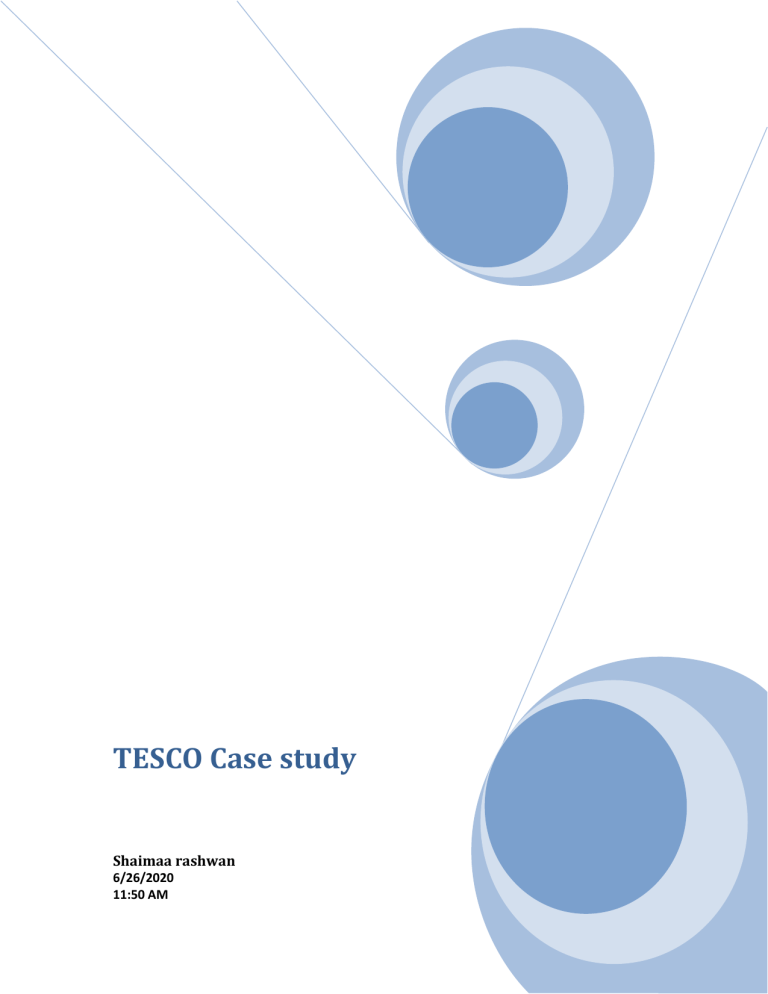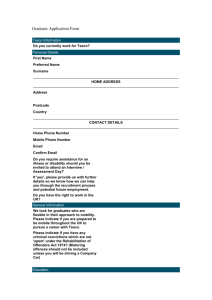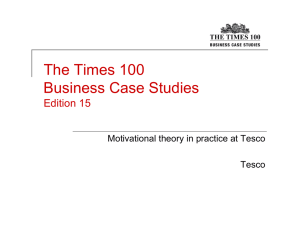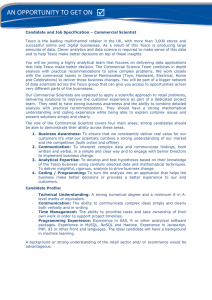
TESCO Case study Shaimaa rashwan 6/26/2020 11:50 AM 1. Describe what a vision is : A vision is an aspirational view of where the business wants to be. It provides a benchmark for what the business hopes to achieve . E.g.Tesco's vision : “A vision is an aspirational view of where the business wants to be. It provides a benchmark for what the business hopes to achieve “ . It is evident from the vision statement of tesco that what desired future state tesco is working for. 2. Explain how Tesco’s values help support its seven part strategy: values of a business helps it always to go big and same is the case with tesco. In the competitive retailing world Tesco’s success relies on its values. They are not just a list of ‘good attitudes’ but the means to on-going success. Tesco’s approach to working with communities helps it stand out from its rivals. Its commitment to using its scale for good is demonstrated by Tesco’s ‘Three Big Ambitions’: • To create new opportunities for millions of young people around the world. • To improve health and through this help tackle the global obesity crisis. • To lead in reducing food waste globally. - These values drive everything Tesco does at every level and help make it different from its competitors. - Strategy and values are helping and serving each other. - A strategy is a plan which sets out how a business deploys its resources to achieve its goals. The company’s values set the tone for the decision-making process. - 3. State Tesco’s core purpose and analyse the importance of strategic planning in helping it to achieve its core purpose: Tesco’s core purpose (mission) is ‘We make what matters better, together.’ - tesco's whole philosophy is focused towards making things better for customers ,employees, society,shareholders and stakeholders. Tesco’s strategic planning consists of 7 part strategy designed to achieve its goals of being highly valued by customers and enjoying strong long-term growth. 1. To grow the UK core : This involved increasing staff numbers by 20,000 over two years, renovating existing stores and introducing more promotions. The core values of making customers feel wanted and respected underpin this strategy. 2. To be a creator of highly valued brands : This involves developing its own-label brands such as F&F clothing and Tesco Finest to provide customers with quality products at competitive prices. 3. To be an outstanding international retailer in stores and online : In 2012, its international businesses generated 30% of the Group’s profits, the new strategy includes opening up to fifty new F&F franchise stores over the next five years in the Middle East, Saudi Arabia, Kazakhstan, Georgia, Armenia and Azerbaijan. 4. To grow retail services in all our markets : Generating £1 billion in revenue in 2012, Tesco Bank is a focal part of the potential for future growth in retail services . 5. To put our responsibilities to the communities we serve at the heart of what we do: In 2011, Tesco made its responsibilities to the communities central to all it does, rather than just be a part of it. This is demonstrated through its ‘Three Big Ambitions’. 6. To build our team so that we create more value: Tesco’s most important asset is its people, who live by its values to do their very best for customers. In keeping with its vision to be a highly valued, innovative growth company, Tesco has committed to training effective leaders in all areas within its Group. To be as strong in everything we sell as we are in food : Food is Tesco’s heritage but the business continues to diversify, adding a wide range of products and services instore and online. 4. Using data in the case study, evaluate the extent to which Tesco’s vision and values affect its success: - Tesco’s vision and values matters a lot in their success. it is their excellent values and vision that has helped them in achieving success all over. They have set up world class vision , mission , values. They have strategic planning to achieve desired future state of business & objectives and tactics to get results. All employees & management and stockholders have work for the best and they have never settled less than the best . 5. Lessons learned: - An effective implementation of strategy depends on proper analysis of external environment. create value to satisfy its customers around the world. The setting of a clear vision is central to success. Establish set of specific objectives and devising strategies to ensure these are achieved. Monitoring and evaluating performance regularly : Strategy, vision, values, aims and objectives are meaningless if their impact is not monitored and evaluated.



